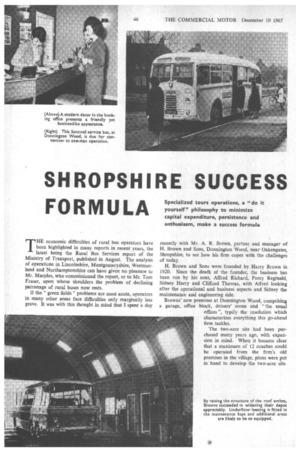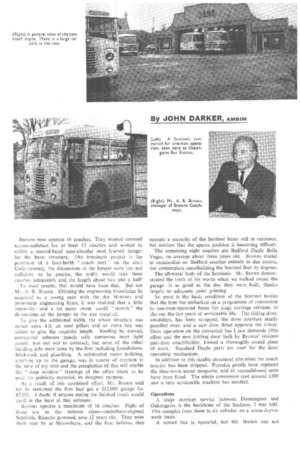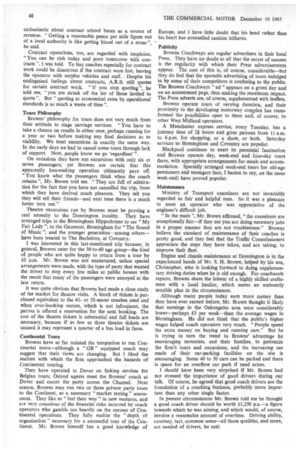SHROPSHIRE SUCCESS FORMULA
Page 48

Page 49

Page 50

If you've noticed an error in this article please click here to report it so we can fix it.
THE economic difficulties of rural bus operators have been highlighted in many reports in recent years, the latest being the Rural Bus Services report of the Ministry of Transport, published in August. The analysis of operations in Lincolnshire, Montgomeryshire, Westmorland and Northamptonshire can have given no pleasure to Mr. Marples, who commissioned the report, or to Mr. Tom Fraser, upon whose shoulders the problem of declining patronage of rural buses now rests.
If the "green fields" problems are most acute, operators in many other areas face difficulties only marginally less grave. It was with this thought in mind that I spent a day recently with Mr. A. R. Brown, partner and manager of H. Brown and Sons, Donnington Wood, near Oakengates, Shropshire, to see how his firm copes with the challenges of today.
H. Brown and Sons were founded by Harry Brown in 1920. Since the death of the founder, the business has been run by his sons, Alfred Richard, Percy Reginald, Sidney Harry and Clifford Thomas, with Alfred looking after the operational and business aspects and Sidney the maintenance and engineering side.
Browns' new premises at Donnington Wood, comprising a garage, office block, drivers' room and "the usual offices ", typify the resolution which characterizes everything this go-ahead firm tackles.
The two-acre site had been purchased many years ago, with expansion in mind. When it became clear that a maximum of 12 coaches could be operated from the firm's old premises in the, village, plans were put in hand to develop the two-acre site. Browns now operate 16 coaches. They wanted covered accommodation for at least 12 coaches and wished to utilize a second-hand semi-circular steel framed hangar for the basic structure. (An imminent project is the provision of a four-berth "coach port" on the site.) Unfortunately, the dimensions of the hangar were just not sufficient—to be precise, the width would take three coaches adequately and the length about two and a half!
To most people, that would have been that. But not Mr. A. R. Brown. Utilizing the engineering knowledge he acquired as a young man with the Air Ministry and prominent engineering firms, it was realized that a little ingenuity—and a lot more sweat—could "stretch " the dimensions of the hangar to the size required.
To give the additional width, the whole structure was raised some 4 ft. on steel pillars and an extra bay was added to give the requisite length. Roofing by curved, corrugated asbestos panels with numerous inset light panels, was put out to contract; but most of the other building jobs were done by the firm including foundations, brickwork and plumbing. A substantial stores building, abutting up to the garage, was in course of erection at the tine of my visit and the completion of this will enable the " ,,hop window" frontage of the office block to be used for publicity material, its designed purpose.
As a result of this combined effort, Mr. Brown told me he reckoned the firm had got a £12,000 garage for £5,000. I doubt if anyone seeing the finished result would cavil in the least at this estimate.
Browns operate a maximum of 16 coaches. Eight of these are in the veteran class—underfloor-engined Sentinels, Ricardo powered, now 12 years old. They were built near by at Shrewsbury, and the firm believes they operate a majority of the Sentinel buses still in existence, but confess that the spares position is becoming difficult.
The remaining eight coaches are Bedford Duple Bella. Vegas, on average about three years old. Browns intend to standardize on Bedford coaches entirely in due course, but contemplate cannibalizing the Sentinel fleet by degrees.
The all-metal body of the Sentinels—Mr. Brown demonstrated the truth of his words when we walked round the garage—is as good as the day they were built, thanks largely to adequate paint priming.
So good is the basic condition of the Sentinel bodies that the firm has embarked on a programme of conversion to one-man-operated buses for stage carriage services, to eke out the last years of serviceable life. The sliding door, amidships, has been scrapped, the door aperture neatly panelled over, and a new door fitted opposite the driver. Door operation on the converted bus 1 saw demands little effort and the new folding door built by Browns' resident part-time coachbuilder, looked a thoroughly sound piece of work. Standard Duple parts are used for the door operating mechanism.
In addition to this sizable structural alteration the coach interior has been stripped. Formica panels have replaced the time-worn uncut moquette, and 41 reconditioned seats have been fitted. The whole conversion cost around £300 and a very serviceable machine has resulted.
Operations A stage carriage service between Donnington and Oakengates is the backbone of the business, I was told. This occupies from three to six vehicles, on a seven-days-aweek basis.
A school bus is operated, but Mr. Brown was not enthusiastic about contract school buses as a source of revenue. "Getting a reasonable pence per mile figure out of a local authority is like getting blood out of a stone ", ' he said.
Contract operations, too, are regarded with suspicion. "You can be rich today and poor tomorrow with contracts ", I was told. To buy coaches especially for contract work could be disastrous if the contract were lost, leaving the operator with surplus vehicles and staff. Despite his undisguised feelings about contracts, A.R.B. still quotes for certain contract work. "If you stop quoting ", he told me, " you are struck off the list of those invited to quote ". But "quoting at economical rates by operitional standards is so much a waste of time ".
Tours Philosophy Browns' philosophy for tours does not vary much from their attitude to stage carriage services. "You have to take a chance on results in either case, perhaps running for a year or two before making any final decisions as to viability. We treat excursions in exactly the same way. In the early days we had to cancel some tours through lack of support. Now, people know we go 'regardless' ".
On occasions they have run excursions with only six or seven passengers, yet Browns are certain that this apparently loss-making operation ultimately pays off. "You know what the passengers think when the coach returns ", Mr. Brown told me. "They are full of admiration for the fact that you have not cancelled the trip, from which they have derived much pleasure. They tell you they will tell their friends—and next time there is a much better turn out."
Theatre excursions run by Browns must be proving a real amenity to the Donnington locality. They have arranged trips to the Birmingham Hippodrome to see "My Fair Lady "; to the Gaumont, Birmingham for "The Sound of Music "; and the younger generation—among others--have been treated to The Bachelors, at Coventry.
I was interested in this last-mentioned trip because, in general, Browns cater for the 30-to-60 age group—the kind of people who are quite happy to return from a tour by 10 p.m. Mr. Brown was not enamoured, unless special arrangements were made, with the type of party that wanted the driver to stop every few miles at public houses with the result that many of the passengers were annoyed at the late return.
It was quite obvious that Browns had made a close study of the market for theatre visits. A block of tickets is purchased equivalent to the 41or 52-seater coaches used and when over-booking occurs, which is not infrequent, the patron is offered a reservation for the next booking. The cost of the theatre tickets is substantial and full loads are necessary, because if as few as three theatre tickets are unused it may represent a quarter of a bus Toad in fares.
Continental Tours Browns have so far resisted the temptation to run Continental tours—although a "GB" equipped coach may suggest that their views are changing. But I liked the realism with which the firm approached the hazards of Continental touring.
They have operated to Dover on linking services for Belgian tours; Ostend agents meet the Browns' coach at Dover and escort the party across the Channel. Next season, Browns may run two or three private party tours to the Continent, as a necessary "market testing" assessment. They like to "feel their way" in new ventures, and are very conscious of the financial risks incurred by coach operators who gamble too heavily on the success of Continental operations. They fully realize the "depth of organization " necessary for a successful tour of the Continent. Mr. Brown himself has a good knowledge of Europe, and I have little doubt that his head rather than his heart has counselled caution hitherto.
Publicity Browns Coachways are regular advertisers in their local Press. They have no doubt at all that the secret of success is the regularity with which their Press advertisements appear. The cost of this is, of course, considerable—but they do feel that the sporadic advertising of tours indulged in by some of their competitors is confusing to the public. The Browns Coachways " ad " appears on a given day and on an accustomed page, thus making the maximum impact. The Press adverts are, of course, supplemented with leaflets.
Browns operate tours of varying duration, and their proximity to the developing motorway complex has transformed the possibilities open to them and, of course, to other West Midland operators.
A Manchester express service, every Tuesday, has a journey time of 2 hours and gives patrons from 11 a.m. to 6 p.m. for shopping, or a show, or both. Saturday services to Birmingham and Coventry are popular.
Blackpool continues to exert its perennial fascination and Browns operate day, week-end and four-day tours there, with appropriate arrangements for meals and accommodation. Specially arranged week-end tours for old-age pensioners and teenagers (not, I hasten to say, on the same week-end) have proved popular.
Maintenance Ministry of Transport examiners are not invariably regarded as fair and helpful men. So it was a pleasure to meet an operator who was appreciative of the engineer's difficult job.
"In the main ", Mr. Brown affirmed, "the examiners are exceptionally fair—if they see you are doing necessary jobs in a proper manner they are not troublesome." Browns believe the standard of maintenance of their coaches is pretty good, and they feel that the Traffic Commissioners appreciate the steps they have taken, and are taking, to improve their fleet.
Engine and chassis maintenance at Donnington is in the experienced hands of Mr. S. H. Brown, helped by his son, Christopher, who is looking forward to doing supplementary driving duties when he is old enough. For coachwork repairs, Browns share the labour of a highly skilled craftsman with a local haulier, which seems an eminently sensible plan in the circumstances.
Although many people today earn more money than they have ever earned before, Mr. Brown thought it likely that earnings in the Oakengates area were considerably Tower—perhaps £3 per week—than the average wages in Birmingham. He did not think that the public's higher wages helped coach operators very much. "People spend the extra money on buying and running cars." But he is trying to turn the trend to Browns' advantage by encouraging motorists, and their families, to patronize the firm's tours and excursions, and the increasing use made of their car-parking facilities on the site is encouraging. Some 40 to 50 cars can be parked and there is space for an overflow car park if need arises.
I should have been very surprised if Mr. Brown had not stressed the importance of good drivers during our talk. Of course, he agreed that good coach drivers are the foundation of a coaching business, probably more important than any other single factor.
In present circumstances Mr. Brown told me he thought a good coach driver should be worth £1,250 p.a.—a figure towards which he was aiming, and which would, of course, involve a reasonable amount of overtime. Driving ability, courtesy, tact, common sense—all those qualities, and more, are needed of drivers, he said.




























































































































